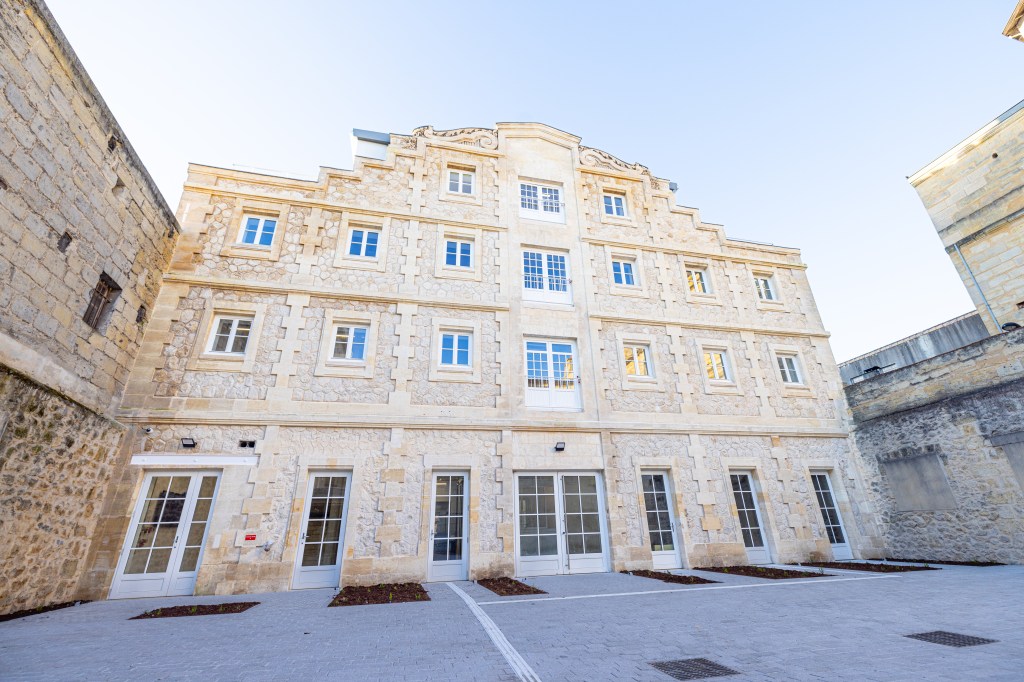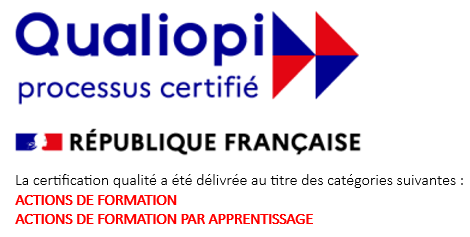
INSEEC Bordeaux : un campus d’école de commerce au centre de la métropole bordelaise
Les quais de la Garonne, bordés de restaurants, de bars et d’espaces de loisirs, abritent aujourd’hui les locaux de l’INSEEC. Situé sur les quais, rue Raze et dans les hangars 16, 17, 18 et 19, le campus offre un environnement d’études exceptionnel et moderne en plein cœur de Bordeaux.
Les 2 immenses terrasses avec vue sur la ville et les salles de cours orientées sur la Garonne confèrent au lieu un cachet unique propice à l’épanouissement des étudiants.
Dans les équipements du campus, notons la présence d’un coin restauration et d’une salle de dégustation haut de gamme de 60 places en plein cœur de Bordeaux. Ce cadre d’exception dédié aux étudiants et professionnels dispose d’équipements de pointe : design d’architecte reconnu, cave à vins, écran connecté, vins, champagnes et spiritueux du monde, verrerie RIEDEL, lave-verres…
Un nouveau bâtiment supplémentaire de 6000m2 au coeur des Chartrons
Le campus de l’INSEEC à Bordeaux s’agrandit de 6000m2 supplémentaires ! Une cafétéria supplémentaire, un fablab, 2 espaces de co-working, un amphithéâtre de 240 places (260 avec les PMR), 20 salles de cours et plus encore… C’est toute une gamme de services supplémentaires qui se rajoute à ceux déjà existants dans les Hangars de l’INSEEC.

Pourquoi choisir Bordeaux pour étudier dans une école de commerce ?
Inscrite sur la liste du Patrimoine Mondial de l’UNESCO et classée régulièrement en tête des villes les plus attractives, Bordeaux profite d’une véritable métamorphose urbaine : façades XVIIIe ravalées, hangars reconvertis en lieux branchés, quais rénovés, entièrement piétons et ouverts sur le fleuve. Ville étudiante par excellence, elle est le port d’attache de notre groupe depuis plus de 35 ans. Bordeaux se positionne par ailleurs parmi les meilleures villes étudiantes en matière :
- d’études (2ème)
- de transport (3ème)
- de culture (4ème)
- de rayonnement international (4ème)
Découvrez le campus de Bordeaux actuel et à venir

L’INSEEC, une école de commerce située dans le grand Bordeaux, une région attractive et dynamique
La métropole bordelaise est l’une des plus dynamiques de l’Hexagone. Avec un taux de 16,9%, Bordeaux est la 2ème ville de France en matière de création d’entreprises. Ses banques, ses incubateurs publics, ses pôles de compétitivité, ses technopoles ou encore ses pépinières d’entreprises favorisent le développement des startups.
La région bordelaise est également un grand territoire viticole, rassemblant plus de 12 000 producteurs, 15 000 marques de vin (noms de châteaux et autres) et 400 maisons de négoce commercialisant 70% de la production des vins de Bordeaux.
Cette filière constitue une véritable richesse pour la région puisque son chiffre d’affaires global atteint 3,4 milliards d’euros dont 1,39 milliard à l’export.
Le complexe aéronautique et spatial constitue l’autre grande force économique de l’agglomération.
Avec des grands noms de la filière comme Thales, Dassault Aviation, ArianeGroup ou Safran Aircraft Engines, la Métropole bordelaise propose aujourd’hui un ensemble de savoir-faire et de technologies majeures tant dans le domaine civil que militaire.
Le pôle bordelais de l’industrie aéronautique et spatiale et ses sous-traitants représente :
- le 3ème bassin d’emplois français,
- le 1er centre national pour le maintien en condition opérationnelle (MCO)
- la 2ème région d’implantation des industries d’armement
- 2 500 personnes dédiées à la R&D publique et privée
A noter également, le développement de l’écosystème du jeu-vidéo depuis quelques années à Bordeaux, que cela soit en termes de jeux indépendants plébiscités par le public ou de gros acteurs tels qu’UBISOFT et ASOBO STUDIO (licence Pixar et Disney).

Extension de 6000m2 du campus Bordeaux Chartrons
Les questions les plus fréquemment posées sur notre campus :
Quels sont les programmes proposés à l’INSEEC sur le Campus de Bordeaux ?
5 Programmes sont présents sur notre campus de Bordeaux
- BTS, programme post-bac en 2ans, pour une professionnalisation rapide en alternance
- BBA, programme post-bac en 4 ans proposant une immersion forte à l’international et délivrant un diplôme reconnu dans le monde entier
- Grande Ecole, programme post bac+2 en 3 ans, le programme grande école porté à l’international
- Bachelor, programme post bac en 3 ans, pour créer grâce une spécialisation continue un parcours sur mesure
- MSc programme post bac +3 en 1 ou 2 ans, pour une spécialisation et professionnalisation en profondeur.


Quelles sont les conditions d’admissibilité pour entrer à l’INSEEC Bordeaux ?
Les conditions d’admissibilité varient selon le niveau d’étude et le programme visé.
Consultez le détail de nos conditions d’admissibilité.
Quel est le prix de la formation à l’INSEEC Bordeaux ?
Le prix de la formation diffère selon le programme, l’année d’étude, la langue d’apprentissage ou encore le type de contrat (initial, continu ou alternance).
Pour plus de détails, consultez la page cursus de votre choix.
Quels sont les campus partenaires à l’international du campus de Bordeaux ?
Si vous voulez voyager et découvrir de nouveaux horizons, vous avez la possibilité de faire une année de césure ou de partir étudier dans un de nos nombreux campus partenaires à l’étranger.
Explorez nos campus partenaires à l’étranger.
Comment est la vie étudiante sur le campus de Bordeaux ?
Parce que tout travail mérite salaire, tout travail mérite récompense. Après une journée d’études intense, rien de mieux qu’aller prendre un verre en bord de Garonne ou depuis un roof top avec sa classe. Ville active, jeune et animée, Bordeaux ne manquera pas d’atouts pour vous séduire !


Quelles sont les associations sur le campus de Bordeaux ?
De nombreuses associations sont disponibles sur notre campus, elles peuvent être :
- Humanitaires
- Sportives
- Festives avec le BDE et l’organisations de nombreuses soirées à thème
- Spécialisées, notamment dans les vins et spiritueux.
Pour plus de détails, veuillez consulter la liste de nos associations à l’INSEEC Bordeaux
Puis-je profiter de bons plans en tant qu’étudiant à l’INSEEC Bordeaux ?
Oui. Une fois admis dans l’une de nos écoles du campus de Bordeaux, vous pourrez bénéficier de nombreux bons plans pour vous faire économiser du temps et de l’argent : En Voiture Simone, Apple, Wili Mobilité….
Quelles études faire à Bordeaux? Conseils pratiques pour choisir sa ville, école et formation.
Une rentrée en février/mars est-elle possible sur le campus de Bordeaux ?
Seuls les programmes Bachelor et MSc proposent une rentrée, soit inversée, soit décalée. Découvrez-en plus en lisant notre article “où faire une rentrée décalée à Bordeaux?”.

Comment accéder au Campus de Bordeaux ?
Les cours peuvent avoir lieu au Hangar 16, 17, 18, 19 ou au 136 quai des chartrons à Bordeaux. Consultez le plan ci-dessous pour avoir plus d’informations.
Télécharger le plan du campus ici.
Certification Qualiopi
Le Campus de Bordeaux a obtenu la certification qualité QUALIOPI, téléchargez ici le certificat.








